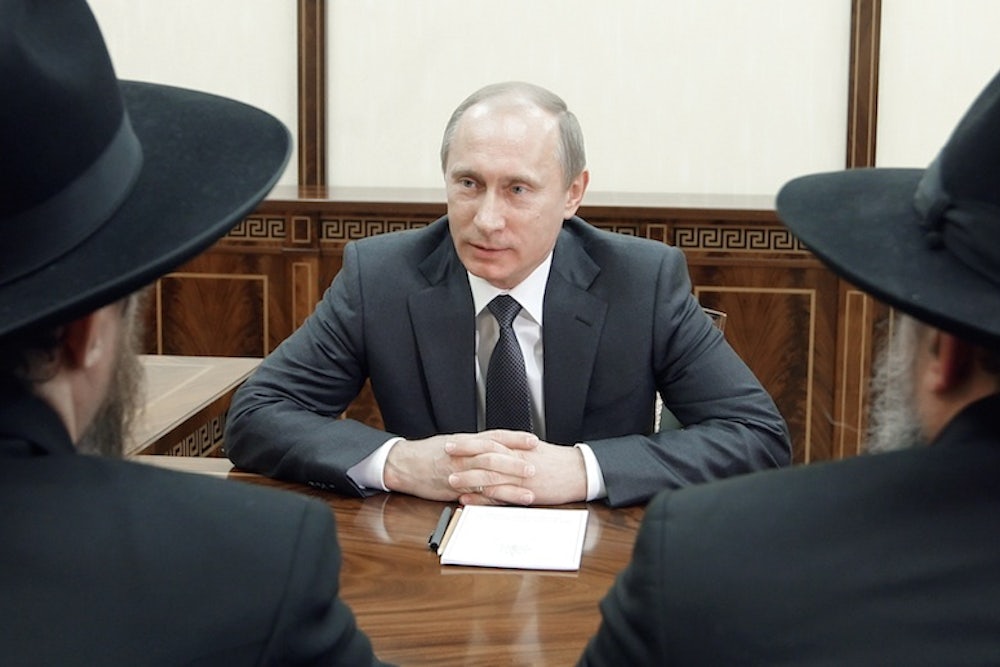Remember when Vladimir Putin said the provisional government in Kiev was brought to power by "nationalists, neo-Nazis, Russophobes and anti-Semites"? Remember how RT, or Russia Today, the Kremlin's English-language propaganda outlet, actively advanced the fiction—and it is a fiction—that anti-Semitism is now running rampant in post-Yanukovych Ukraine? The stories about Odessa Jews being evacuated, of Ukrainian synagogues being attacked, the stories on the anti-Semitic statements of Ukrainian nationalists involved in the Maidan movement?
Well, the Simon Wiesenthal Center has demanded that Russia Today publicly apologize for a video that aired on its channel, which the Center said was "eight minutes of raw Jew-hatred and unambiguous group defamation." The video, made by an Australian media company, purports to rap its way through the Israeli-Palestinian conflict, in the process marshalling quite a few classic anti-Semitic stereotypes.
"Does screening this repugnance signal an RT policy shift?" the statement went on, quoting Shimon Samuels, Director for International Relations at the Wiesenthal Center. "If so, you have made a mockery of Russia’s 9 May Victory commemoration, as you soil the memory of more than 20 million Soviet citizens—among them over 500,000 Jewish soldiers of the Red Army—who fell victim to the Nazi scourge."
In response, Russia Today said that it had no role in the production of the video and simply had beamed it across the universe, unchecked. Then it accused the Simon Wiesenthal Center of anti-Semitism.
Were that this was one, isolated incident. Unfortunately, despite Moscow's assertions that it needs to protect Russian speakers from the fascists and anti-Semites now in power in Kiev, the rise of Russian nationalism at home has brought with it an ugly tide of Russian anti-Semitism.
The Russian Jewish Congress, for instance, issued a report saying that there has been a marked increase in anti-Semitism in Russia in the first four months of 2014. Though there were no physical attacks on Jews, there were some minor incidents—everything from cemetery attacks to Russian nationalist thugs chanting anti-Semitic slogans. But most of this rise, the Congress reports, "was manifested first and foremost in public anti-Semitic statements, the number of which has increased dramatically."
The report notes public statements from politicians, like the member of Putin's United Russia party in Kaliningrad who accused his opponents of being "Jews, hiding among the opposition" and destroying the country. Dmitry Kiselev, who has threatened to turn the U.S. "into radioactive ash," was called out for pointedly pointing out the Jewish names of some opposition writers and saying that they should be wary of comparing the Sochi and 1936 Berlin Olympics because, in Germany, they wouldn't have been allowed to write, let alone live. The columnist of one state-friendly Russian newsletter listed Jewish members of the Russian opposition, saying that "they have no homeland because of their political beliefs."
In February, the news anchor of Rossiya24, one of Russia's largest state-controlled television channels, agreed with the ardently nationalistic (and often anti-Semitic) author Alexander Prokhanov, who said that Jewish organizations "were ushering in a second Holocaust with their own hands ... just as they ushered in the first one."
And last month, the Jewish daily newspaper the Forward noted that Russian state television's hatchet-job "documentaries" about Ukrainian politicians Yulia Tymoshenko and Arseniy Yatsenyuk stressed, in ominous terms, their allegedly nefarious Jewish roots.
It all started with a Russian television "documentary" on former Ukrainian President Yulia Tymoshenko, aired on March 30. The film was a propaganda piece in the Soviet style—unrelenting character assassination with ominous, grating background music. Tymoshenko's whole career, the narrator intoned, was one of embezzlement, criminality, back-stabbing of associates, and secretly ordering assaults and killings. Then, toward the end, the culminating "disclosure": Tymoshenko was Jewish. "She completely hides her origin. But for many, it is no secret that the father of this woman with a hair-braid—Viktor Abramovich Kapitelman—has Jewish roots."...
A few days earlier, the same documentary news program did a similar hatchet-job on Ukrainian Prime Minister Yatseniuk, and indulged in the rhetoric of the 1970s: Yatseniuk was not just a Jew, but a Zionist. "One must take into consideration his Jewish origin. He is a Jew on his mother's side, and is one of the fifty most famous Zionists in Ukraine."...
For the conventional (non-anti-Semitic) Russian viewer, these disclosures of Jewishness were insignificant—after all, they lasted only 20 seconds in a half-hour program. Or they could be brushed aside as editorial lapses into bad taste. But for the Russian ultra-right, these words were gold. They legitimized their wedding of anti-Ukrainianism to anti-Semitism.
Putin's critics have long conceded that while he is many things, he is not an anti-Semite. His closest childhood friends (now, coincidentally, billionaires on the U.S. Treasury sanctions list) are Jews. So was his judo coach and replacement father, Anatoly Rachlin. After Rachlin's funeral, Putin took a dramatic and solitary walk through his hometown. He has been good to the Russian Jewish community.
But the Russian nationalism he has unleashed to buttress both his hold on power at home and his imperialist policy abroad is not free. Russian nationalism has always been mixed up with often violent anti-Semitism. It's why the U.S. has such a large Jewish population: Millions of Jews fled the Russian empire at the end of the 19th century because of this poisonous combination. Millions more fled at the end of the 20th because it was resurrected again under the guise of Soviet patriotism. This time, there are no longer millions of Jews to flee the place, but there are just enough left in politics and culture to point out as aliens incapable of loving the Motherland.
In Ukraine, meanwhile, the Jews are standing with the provisional government in Kiev, which has even appointed one of them to run the Dniepropetrovsk region.
Just something to keep in mind next time the Kremlin accuses Kiev—or the Simon Wiesenthal Center—of anti-Semitism.
